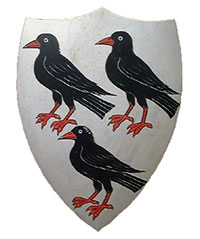Location: University of Kent
Scholarship amount: University fees for a UK/EU student and annual stipend for three years
Hours: Full time
Deadline for applications: 25th August 2015
Description: The science of reintroducing species back into the wild has evolved into a distinct branch of conservation biology in its own right. Indeed, reintroduction biology is now embraced by the International Union for Conservation of Nature as a fundamental tool for species recovery and ecosystem management. The Durrell Institute of Conservation and Ecology (DICE) at the University of Kent has been working at the forefront of species conservation and reintroduction biology with partners around the world for over two decades. An opportunity has now arisen to apply this experience and expertise locally, with an analysis of the feasibility of bringing back the iconic Red-billed Chough to Kent.
The Chough population has become highly fragmented with several isolated populations around the coast of Britain in West Wales, Scotland, Isle of Man and a small population in Cornwall. The Chough was once more widespread and formerly occurred as far east as Kent where it became extinct ca. 160 years ago. However the Chough still lives on in the coat of arms of Canterbury City and the University of Kent, and in Shakespeare’s King Lear (Act IV, Scene vi– Fields near Dover), where the Chough is inroduced in the description of the Dover Cliffs.
The decline of the species in the UK has been due to a number of factors including persecution, pesticides-use and changes in farming practice. Decline in sheep farming has been identified as a particular cause, since sheep produce the close-cropped grasslands where the Choughs preferentially graze. Consequently, the species has contracted to areas such as Wales. This has been the focus of management practice in the restoration of the species in Cornwall and other areas. Potential habitat still remains for Choughs in Kent with large areas of SSSI and farmland along the east coast.
Aims and Objectives:
1. Consultation of local attitudes to a proposed reintroduction: This will use social science methods to gather quantitative and qualitative data on awareness, attitudes, and knowledge of the Chough and a potential reintroduction among the wider local community.
2. Habitat suitability and risk analysis: Combine an ecological assessment of potential release sites with an impact and risk assessment of a potential reintroduction. This will require ecological surveys of potential habitats, GIS and species distribution modelling.
3. Population viability analysis: Utilise genetic, environmental and demographic data to determine the minimum population size and optimal population structure for a successful reintroduction.
Partners: This project builds on the experience of Durrell Wildlife Conservation Trust who have pioneered bird reintroductions in Mauritius as well as the Chough reintroduction to Jersey through the Birds on the Edge project. The project will also partner with Operation Chough, based at Paradise Park in Cornwall, who have led the ex situ components of the reintroduction programme; Kent Wildlife Trust, who own and manage a network of Local Wildlife Sites in the county; and Wildwood Trust in Kent, a leading centre for the conservation and rewilding of British Wildlife.
Supervisors: Dr Dave Roberts, Dr Jim Groombridge, Dr Bob Smith, Professor Richard A. Griffiths.
Advisor: Professor Carl Jones MBE.
Requirements: The project will require a versatile student who will be trained in both social science and natural science survey methods; GIS and species distribution modelling; and population genetics and ecology. The scholarship includes university fees for a UK/EU student and annual stipend for three years (non-EU students can apply but must demonstrate they have funds to pay the non-EU fee).
The student will be required to take forward the dialogue with local organisations, identifying potential release sites with them through applying the research, and produce a reintroduction plan in conjunction with IUCN/SSC (2013) guidelines. The student will be expected to undertake some teaching as a Graduate Teaching Assistant on undergraduate programmes.
Applications: Applicants should have at least a 2:1 Honours degree and a good MSc in a relevant subject. Graduates who can demonstrate equivalent relevant experience to MSc level through professional work, research and publications may also be considered. A demonstrable aptitude for interdisciplinary research and quantitative analysis is also required, together with an interest in bird conservation and/or reintroduction biology, and a clean driving licence.
Applications should comprise a covering letter (1 page) and CV (4 pages max), together with the names and contact details of two referees who may be approached, and should be sent to Dr Dave Roberts (D.L.Roberts@kent.ac.uk) by 4.00 pm on 25 August 2015. Interviews will be held within 1-2 weeks of the deadline, and the studentship is expected to start in late September 2015 or as soon as possible thereafter (but no later than January 2016).
For full details, including references, see our scholarships page.
Image is of the arms of Thomas Beckett, Archbishop of Canterbury: argent, three Cornish choughs.

